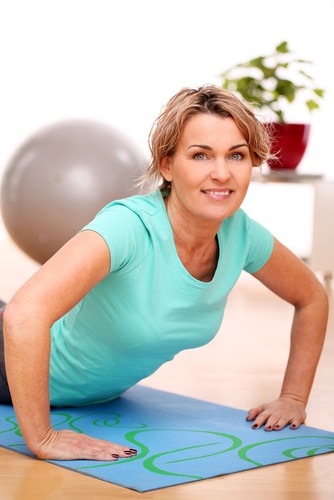 Menopause affects each woman differently. Some women sail through menopause relatively free of hot flashes or other symptoms while other women have heat intolerance, night sweats and lots of mood changes and sleep disturbances that cause them to feel anxious or irritable. You might expect women who lead a healthy lifestyle – especially those who exercise – might be burdened with fewer of these symptoms. What effect does exercise have on menopausal symptoms?
Menopause affects each woman differently. Some women sail through menopause relatively free of hot flashes or other symptoms while other women have heat intolerance, night sweats and lots of mood changes and sleep disturbances that cause them to feel anxious or irritable. You might expect women who lead a healthy lifestyle – especially those who exercise – might be burdened with fewer of these symptoms. What effect does exercise have on menopausal symptoms?
Exercise and Menopause
A good workout will certainly make you sweat but does it help to prevent pesky night sweats and hot flashes during menopause? Results are mixed. A Swedish study involving 142 women found that women who worked out regularly had only half the number of hot flashes compared to women who didn’t regularly break a sweat. Other small studies also show that exercise reduces hot flashes. Not all studies are supportive though. A recent study published in the journal Menopause involving almost 250 women found exercise slightly reduced the number of hot flashes the participants had daily but the sedentary group experienced the same benefits.
Despite the lack of evidence in this most recent study that exercise reduces hot flashes, don’t assume working out doesn’t make the transition easier. This study DID show women who exercised regularly slept better and experienced fewer mood disturbances and depressive-type symptoms. Up to one out of five women experienced problems with depression during menopause and even more have problems sleeping.
Why are sleep problems so common? As you approach menopause, estrogen and progesterone levels drop. It’s the drop in progesterone that seems to have the greatest impact on sleep. It’s not clear why regular exercise improves sleep in women going through menopause, but research suggests that vigorous workouts are the most beneficial for promoting sound sleep. This appears to be true whether you’re going through menopause or not, possibly because intense exercise is more exhausting. Regardless, it’s a good reason to boost the intensity of your workouts.
Menopause, Mood Changes and Exercise
It’s not uncommon for women going through menopause to feel irritable or “down.” With its impact on brain biochemicals and endorphins, it’s not surprising that exercise would have benefits. A study published in the Journal of Clinical Nursing found that exercise helps to relieve symptoms of anxiety and depression during menopause. Research also shows that mind-body exercise like yoga has mood boosting benefits. The key is to stay active!
Other Benefits of Exercise during Menopause
High-impact exercise and resistance training also prevents loss of bone mass, a problem that accelerates after menopause. In fact, up to 20% of bone mineral loss occurs within seven years of menopause due mostly to a drop in estrogen. Loss of muscle tissue is also a problem. Sarcopenia, or age-related loss of muscle, is common and contributes to loss of strength, balance problems and the slow-down in metabolism that many women experience as they age. That’s why resistance training to build lean body mass and preserve strength is so important.
Here’s a discouraging statistic. Most women gain between ten and fifteen pounds after menopause and a recent study showed that even women who eat healthy experience problems controlling their weight once their hormone levels drop. Exercise helps to prevent weight loss and the changes in body composition that occur during this time. As estrogen levels drop, cells become less sensitive to insulin. This insulin resistance makes it easier to store fat, especially in the deep abdominal region. Estrogen also has an impact on resting metabolic rate. As estrogen levels drop it causes a metabolic slowdown. In addition, exercise helps to increase insulin sensitivity. Plus, high-intensity exercise causes an after-burn that boosts calorie burn even after you finish. What’s not to love about that?
The Bottom Line?
Cardiovascular and resistance training are two of the most important things you can do to stay healthy during and after menopause. It won’t necessarily reduce the number of hot flashes you experience but it can improve your mood and help you get a good night’s sleep. Plus, it lowers the risk for common age-related health problems like osteoporosis, sarcopenia, heart disease and type 2 diabetes.
Some women avoid lifting heavy weights but it’s even more difficult to build lean body mass after menopause – so challenge yourself. Remind yourself of all the health benefits you’re getting by working up a sweat and lifting hard. Exercise really is the best prescription for staying young.
References:
Harvard Health Publications. “Excerpt from Mind Over Menopause”
Menopause. “Efficacy of exercise for menopausal symptoms: a randomized controlled trial”
National Sleep Foundation. “Menopause and Insomnia”
Curr Med Chem. 2006;13(29):3575-82.
J Clin Nurs. 2012 Apr;21(7-8):923-8.
Evidence-Based Complementary and Alternative Medicine. Volume 2012 (2012), Article ID 863905.
J Gerontol A Biol Sci Med Sci. 1995 Nov;50 Spec No:5-8.
WebMD. “Menopause, Weight Gain and Exercise Tips”